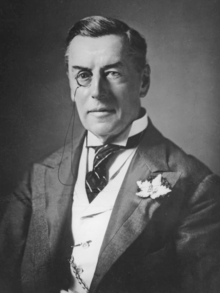约瑟夫·张伯伦
此条目没有列出任何参考或来源。 (2014年4月13日) |
| The Rt Hon Joseph Chamberlain 约瑟夫·张伯伦阁下 | |
|---|---|
 | |
| 反对党领袖 | |
| 任期 1906年2月 | |
| 君主 | 爱德华七世 |
| 首相 | 亨利·坎贝尔-班纳曼爵士 |
| 前任 | 阿瑟·贝尔福 |
| 继任 | 阿瑟·贝尔福 |
| 殖民地事务大臣 | |
| 任期 1895年6月29日—1903年9月16日 | |
| 总理 | 索尔兹伯里侯爵 阿瑟·贝尔福 |
| 前任 | 里彭侯爵 |
| 继任 | 亚弗烈·利特尔顿 |
| 贸易委员会主席 | |
| 任期 1880年5月3日—1885年6月9日 | |
| 总理 | 威廉·尤尔特·格莱斯顿 |
| 前任 | 珊顿子爵 |
| 继任 | 里士满公爵 |
| 个人资料 | |
| 出生 | 1836年7月8日 |
| 逝世 | 1914年7月2日(77岁) |
| 墓地 | 伯明翰启伊山墓园 52°29′28″N 1°54′52″W / 52.4911841°N 1.9143426°W |
| 政党 | |
| 儿女 | 奥斯丁·张伯伦 内维尔·张伯伦 |
| 职业 | 商人、政治家 |
| 签名 | |
约瑟夫·张伯伦(Joseph Chamberlain,1836年7月8日—1914年7月2日),英国政治家。与当时其他政治家不同,张伯伦是一个没有接受过大学教育、白手兴家的商人。
早年
[编辑]1836年7月8日,约瑟夫·张伯伦生于伦敦,他父亲(也叫约瑟夫)是一名成功的鞋匠。张伯伦在学生时代法语和数学成绩优异,但由于家庭的原因,16岁时张伯伦主动辍学去自家的工厂上班。
工人企业家
[编辑]18岁时,张伯伦到伯明翰加入其叔父的螺钉生意,此后事业越做越大,成为著名的螺钉生产商,其产品占据英格兰三分之二的市场,并出口至美国、欧洲、印度、日本、加拿大和澳大利亚。
生活中的张伯伦关心时事,思想激进,擅长法语,喜欢辩论,经常参加辩论协会的活动。张伯伦信奉基督教一位论派,在英国还没有建立国民教育体系的年代,他曾在伯明翰的主日学校任教,是一位贴近下层群众的资本家。
从政
[编辑]张伯伦初入政坛时,是一个自由党激进派,争取教育改革。四十岁时,他才进入议会,比其他重要政治家较晚。威廉·格莱斯顿在第二次出任首相时,考虑了张伯伦对自由党基层组织的影响力,邀请他出任贸易委员会主席。这段时间,他变得广为人知。首先是因为他大加批评保守党领袖索尔兹伯里勋爵,然后是因为他在1885年大选期间,提出一个使农业劳工受惠的“未经批准计划”(Unauthorised Programme)。1886年,他因为不满首相格莱斯顿推动爱尔兰自治运动,辞职下野。自由党分裂后,他加入了大部分党员来自伯明翰及其周边地区的自由统一党。
自1895年大选起,自由统一党就和索尔兹伯里勋爵所领导的保守党合作。两党胜出后,索尔兹伯里勋爵邀请他加入政府,担任殖民地大臣。殖民地大臣任内,第二次布尔战争爆发,张伯伦负责了战时大部分军务。他是在1900年的“卡其大选”中左右选情的人物之一。1903年,他辞去殖民地大臣一职,进行关税改革运动。在这个议题上,虽然大部分自由统一党议员都支持张伯伦,但是仍然有少部分人与他意见不合,自此与他分道扬镳。结果,自由统一党在1906年大选中完全失败。几个月后,刚满七十岁的他患上了中风,从此退出政坛。
后人评价
[编辑]虽然约瑟夫未能成为首相,但是他仍然被视为19世纪、20世纪之交最重要的英国政治家之一。他既是一位出色的演说家,又是一个有趣的人物,曾使两个主要政党分裂。温斯顿·丘吉尔称他为一个“呼风唤雨”的人。约瑟夫是奥斯丁·张伯伦爵士和首相内维尔·张伯伦的父亲。
注脚
[编辑]延伸阅读
[编辑]- Balfour, Michael. Britain and Joseph Chamberlain (1985), scholarly biography emphasizing economic topics
- Browne, Harry. Joseph Chamberlain: Radical and Imperialist (Longman Higher Education, 1974), 100 pp introduction
- Cawood, Ian, and Chris Upton, eds Joseph Chamberlain: International Statesman, National Leader, Local Icon (Springer, 2016) online (页面存档备份,存于互联网档案馆); online review (页面存档备份,存于互联网档案馆)
- Cawood, Ian. "Conclusion Joseph Chamberlain: His Reputation and Legacy." pp 229–243.
- Cawood, Ian, The Liberal Unionist Party: A History (2012) online (页面存档备份,存于互联网档案馆)
- Cohen, Avner. Joseph Chamberlain, Lord Lansdowne and British foreign policy 1901–1903: from collaboration to confrontation. Australian Journal of Politics and History. 1997, 43 (2): 122–34. doi:10.1111/j.1467-8497.1997.tb01383.x.
- Crosby, Travis L. Joseph Chamberlain: A Most Radical Imperialist (London: IB Tauris, 2011). Pp. xii+ 271.
- Ensor, R. C. K. England 1870-1914 (1936), scholarly survey
- Fraser, Derek. "Joseph Chamberlain and the Municipal Ideal," History Today (April 1987) 37#4 pp 33–40
- Fraser, Peter. Joseph Chamberlain: Radicalism and empire, 1868–1914 (1966)
- Garvin, J. L.; Amery, Julian. The Life of Joseph Chamberlain. London: Macmillan. 1932–69. (6 vols); highly detailed with many letters; friendly to Chamberlain; vol. 1 online
- Howell, P.A.. 'Joseph Chamberlain, 1836–1914'. In The Centenary Companion to Australian Federation, edited by Helen Irving, (Cambridge University Press, 1989)
- Halevy, Elie. Imperialism and the rise of labour, 1895–1905 (Vol. 5. 1934), Survey of the era with considerable attention to Chamberlain's position on major issues.
- Hunt, Tristram. Building Jerusalem: The Rise and Fall of the Victorian City, (Weidenfeld and Nicolson, 2004) pp 232–265; his role in Birmingham.
- James, Robert Rhodes. "Radical Joe" History Today (Sep 1957) 7#9 pp 618-626, popular account by a scholar
- Jay, Richard. Joseph Chamberlain, A Political Study (Oxford UP, 1981), Scholarly biography focused on major national issues
- Judd, Denis. Radical Joe: Life of Joseph Chamberlain (H Hamilton, 1977), a scholarly biography.
- Kubicek, Robert V. The administration of imperialism: Joseph Chamberlain at the Colonial Office (Duke UP, 1969)
- Mackintosh, Alexander. Joseph Chamberlain: An Honest Biography (2nd ed. 1914), early scholarly biography online free
- Marsh, Peter T. Joseph Chamberlain: Entrepreneur in Politics, (Yale UP, 1994); 720pp; David Nichols says it is "comprehensive, judicious, scholarly, and eminently readable....[and] successfully integrates the public and the private to provide the first fully rounded account."
- Marsh, Peter T. "Chamberlain, Joseph (1836–1914)", Oxford Dictionary of National Biography, Oxford University Press, 2004; online ed., Sept 2013 accessed 3 July 2014, a short scholarly biography.
- Nicholls, David, "Chamberlain, Joseph" in David Loades, ed. Reader's Guide to British History (2003) 1: 243–44; historiography
- Otte, T. G. "'Intimately dependent on foreign policy': Joseph Chamberlain and Foreign Policy" in I. Cawood, ed. Joseph Chamberlain International Statesman, National Leader, Local Icon (2016).
- Porter, Andrew N. The Origins of the South African War: Joseph Chamberlain & the Diplomacy of Imperialism, 1895–99. Manchester: Manchester University Press. 1980. ISBN 9780719007637.
- Porter, Andrew. Lord Salisbury, Mr. Chamberlain and South Africa, 1895–9. Journal of Imperial and Commonwealth History. 1972, 1 (1): 3–26. doi:10.1080/03086537208582359.
- Porter, Andrew. The South African War (1899–1902): context and motive reconsidered. Journal of African History. 1990, 31 (1): 43–57. doi:10.1017/S0021853700024774.
- Powell, Enoch J. Joseph Chamberlain. London: Thames and Hudson. 1977. ISBN 978-0500011850.
- Strauss, William L. Joseph Chamberlain and the Theory of Imperialism. Washington: American Council on Public Affairs. 1942 [2020-10-02]. (原始内容存档于2020-08-02).
- Sykes, Alan. Tariff Reform in British Politics, 1903–1913. Oxford: Clarendon Press. 1979. ISBN 9780198224839.
- Zebel, Sydney. Joseph Chamberlain and the Genesis of Tariff Reform. Journal of British Studies. 1967, 7 (1): 131–57. doi:10.1086/385547.
